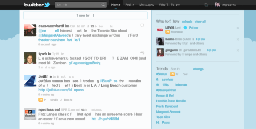Case study: Twitter [2]
Introduce yourself
A short, snappy, engaging, positive bio on your Twitter profile, could usefully include aspirations/hobbies/general interests - take the opportunity to create a positive impression.
Who shall I follow?
 Consider the following: Newspaper accounts, journals, journalists, publishers, Government Ministers, thought leaders, professional governing bodies, other clinicians or professionals you admire. You might be amazed by those who respond when you reach out to them and engage them in dialogue, helping to raise your profile. Use hash tags to follow conferences you wish you could have attended. All of these can indicate that you take your career and the use of social media seriously.
Consider the following: Newspaper accounts, journals, journalists, publishers, Government Ministers, thought leaders, professional governing bodies, other clinicians or professionals you admire. You might be amazed by those who respond when you reach out to them and engage them in dialogue, helping to raise your profile. Use hash tags to follow conferences you wish you could have attended. All of these can indicate that you take your career and the use of social media seriously.
How/what shall I tweet?
Be topical, share interesting information about issues that affect your work. Short, insightful links, statements, opinions and questions are likely to be retweeted and help raise your profile in a positive way.
Be sure to always try to add a personal impression, opinion or comment before you retweet policy consultation documents such as any new guidelines on social media policy, articles in the broadsheets, government policy discussions. There are regular, scheduled discussions on Twitter about issues around health - to be fair, these could benefit from your insight as they often have few users as familiar with social media as you may be - show other Twitter users how it is done!
It doesn't have to be all about work, be sure to continue to actively communicate with friends on platforms such as Twitter and Instagram. Demonstrate your fluency with social media and continue to actively integrate it with all aspects of your life as you currently do. Showcase your charisma and social skill!
Fake News
It is important to scrutinise the sources of "news" we are accessing through our social media and online searches carefully, educating ourselves on how to spot fake news before reposting on our social channels - it's far too easy to ignore the fact that we may be unwittingly operating in an echo chamber through biased, tailored online searches. There is a terrific resource on how to spot Fake News.
Share specially selected photos of you on elective/in sporting kit/socialising with friends - showcase the wide range of interests that you have.
Carefully consider ways to highlight your satisfaction when you do well in an exam or assessments, receive praise in practice or achieve sporting accolades, without coming across as arrogant or overly self-congratulatory. Perhaps congratulate a peer on their success first? This takes practice and genuine skill, be sure not to come off as narcissistic, insincere or overtly engaged in self-promotion.
Tweetdeck is a great way to manage a twitter account, alerting you to any discussions around issues that interest you. It is easy to set up searches for words and subjects you are interested in. It is also a great way to manage multiple Twitter accounts, if you are also contributing to a Twitter account for a sports team or club at University. Volunteering to manage a Twitter account for one of your clubs or societies at university is a valuable piece of experience to record on your CV and Linkedin.
How to/what not to Tweet?
You don't have to be stuffy or devoid of personality - you can use emoticons and Twitter slang (if that is what you like to do), but craft a worthy impression of you and those you represent. Humour should always be in good taste - it is too easy for quotes to be taken out of context or mis-interpreted. Think twice, post once.
It is best to be seen to Tweet or update your status on social profiles before the work day begins, at lunch time and at the end of the day - to be clear that you are not distracted from your work.
 Apologise in public when you are wrong. Be authentic. If you make a mistake, admit it quickly and in public, before you delete the original comment.
Apologise in public when you are wrong. Be authentic. If you make a mistake, admit it quickly and in public, before you delete the original comment.
Never Tweet or update your status when drunk and don't refer to a hangover or recreational drug use.
Some senior colleagues, new to social media, can get lost with the jargon when commencing use of social media platforms, using poor net etiquette, for example - giving "shout outs" to new followers - without following people back and not realising that can be seen as self-satisfied gloating. If you are a proficient social media user, set a great example. Demonstrate good social media etiquette and sensitively inform new older users that LOL is not 'lots of love'. Make your knowledge of social media an asset to the team you are in! Diplomatically inform anyone you find using Whatsapp for clinical or sensitive client communications that it is not appropriate and will violate the new GDPR.